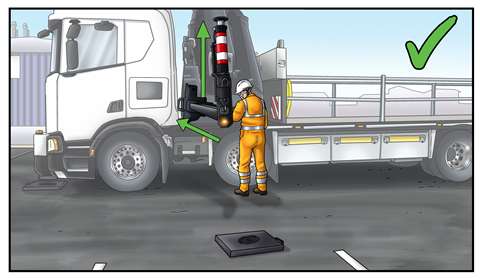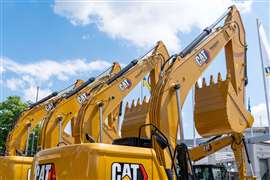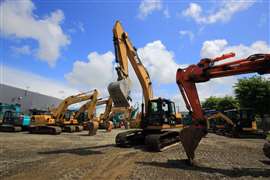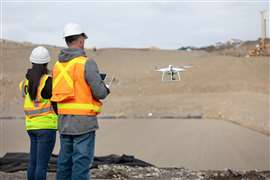Controversy over Skanska loader crane ban
25 July 2022
 Detailed information on the safe use of swing-up stabilisers is available from UK loader crane association ALLMI. Image: ALLMI
Detailed information on the safe use of swing-up stabilisers is available from UK loader crane association ALLMI. Image: ALLMI
Construction contractor Skanska is banning the use of loader cranes with a certain type of swing up stabilisers from its United Kingdom sites. Industry association ALLMI has suggested a different approach.
Coming into force on Monday 1 August the ban applies to lorry loader cranes fitted with hydraulic tilting and hydraulic deployment stabiliser legs which rotate across the position of the fixed controls.
Skanska said the move will “help avoid the risk of operators becoming trapped by ‘swing-up’ stabilisers that can inadvertently be rotated and drawn into the area where fixed controls are in position.”
Its ban follows a fatal accident on a Skanska UK site at Shirehampton, Bristol, in September 2021 where this type of stabiliser was involved, the company said.
Skanska said it “worked closely with the Health and Safety Executive (HSE), the Association of Lorry Loaders Manufacturers and Importers (ALLMI) and directly with manufacturers to highlight the risk to operators of being crushed by this type of stabiliser.”
Since the accident ALLMI issued the following: a Swing-Up Stabilisers Safety Alert, in October 2021 and since revised; and a guidance note, #033, Swing-up Stabiliser Safety. The latter focuses mainly on how to safely retract swing-up stabilisers. “Guidance is required because where the swing-up stabiliser rotates across the position of fixed hold-to-run controls (on one or both sides of the vehicle), there is a risk of the operator being crushed if they fail to correctly use and observe the stabiliser throughout the retraction process,” ALLMI said.
What is the extent of the impact?
Skanska said not many cranes in the UK are affected by its ban. “In a recent survey, 47 lorry loader-related unloading activities were reviewed and only two operated with the stabiliser being able to be moved across the fixed controls.”
ALLMI chairman Alan Johnson, however, said the ban includes the use of lorry loaders with radio remote controls where the leg rotates across fixed controls, and in this situation ‘fixed controls’ includes emergency levers or equipment on which the standard levers have been removed.
This significantly increases the number of cranes and vehicles affected, Johnson said in a letter to members and other industry stakeholders. He gave an example that one of the association’s larger Operators’ Forum members “has effectively gone from having no vehicles included in the ban, to almost all of its fleet. This includes new vehicles where the builds were interrupted to specifically remove the fixed lever operating stations in direct response to the original safety alerts issued in October 2021.”
Skanska UK said it is “collaborating closely with our supply chain partners to ensure they can provide alternative delivery vehicles where required. Vehicles affected by the ban are predominantly those delivering bulky items such as cabins and welfare units.”
Rather than minimal impact, Johnson said ALLMI considers the Skanska ban to constitute a disproportionate response with the potential to cause irrevocable damage to the UK lorry loader industry. “Given the unlikely scenario of needing to use emergency levers (which would require failure of both the radio control and the back-up umbilical cord) and, given the other control measures that could be put in place, to include this equipment in the ban constitutes a disproportionate response, and one which has the potential to cause irrevocable damage to the UK lorry loader industry. This, in turn, could lead to widespread disruption of the cabin and plant sector, or the ban being largely ignored out of sheer necessity on site.”
Association response
Instead of a blanket ban ALLMI advocates the following response:
* An amendment to EN 12999 (the current loader crane standard applicable in Europe), work on which is already underway.
* Development of retrospective solutions (in the UK by installers and importers) made available to duty holders and fleet owners.
* Continuing with ALLMI campaigns and training course amendments for all lifting team roles, a process which commenced in October 2021.
* Access to site tightly controlled via the lift plan review and approval process, with the hazard being treated in the same way as all other well-known lifting hazards.
* Site supervision and discussion on site induction, etc. in cases where there are positively identified concerns, with reference to ALLMI guidance and additional suitable controls being enforced.
The Swing-Up Stabilisers Guidance Note and the Swing-Up Stabilisers Safety Alert are also available.
Supporting documents
Click links below to download and view individual files.







